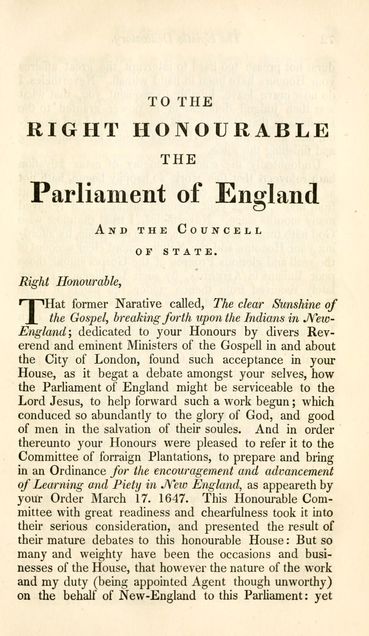John Eliot, The Glorious Progress of the Gospel, Amongst the Indians in New England (England, 1649) (pages 68-98)

Tianzhi Gao, Lisa Chen and Hannah Craig
Throughout the seventeenth century, colonial expansion in New England meant that Native tribes were forced to relinquish their land, their resources, and their culture. Central to the natives’ loss of their culture was missionary work. Fueled by the desire to bring English civilization to the ‘uncivilized’ Natives, certain ministers such as John Eliot and Thomas Mayhew Jr. worked to convert the Indians to Christianity. The Glorious Progress of the Gospel, Amongst the Indians in New England, is a collection of some of Eliot’s and Mayhew’s letters detailing their missionary work. The letters were compiled by Edward Winslow, the Massachusetts Bay Colony’s agent with London, with an appendix written by J.D. (we suppose he was John Dury). This collection is addressed to the English Parliament in the hopes of gaining support and funds for the missionary work in the New England colony.
Mayhew’s letter provides three anecdotes of Indians falling ill and cured by the minister. What it also shows is a certain level of contempt he holds for Pawwaws, the Indians’ healers and sorcerers. What may look like three instances of him curing ill Indians, are in actuality, three instances of Mayhew undermining the Pawwaws’ abilities as a means of raising his own status with the Indians. The letter illustrates Mayhew as a missionary spreading Christianity when the Indians are at their weakest and most vulnerable. While at times he seems genuinely happy to help the Native’s, at other times, the tone of the letter does not always indicate that Mayhew truly is concerned for Indians he helps and that any misfortune that happens to the Native is simply due to their rejection of a Christian God. By recounting these stories of miraculous healing and divine intervention, Mayhew is appealing to Parliament for more funding and resources in order to continue his work of converting more Native Americans.
Eliot’s letters are similar to Mayhew’s in that he provides some anecdotes of the Indians that he meets. Eliot, like Mayhew, looks out for the well-being of the Indians that he has converted and hopes to convert. The three letters included in The Glorious Progress of the Gospel, Amongst the Indians in New England compilation detail the some ideas he considers and activities he engages in order to fulfill his ideal praying-Indian society. Where Eliot deviates from Mayhew is the scope of his work. The letters mention his consideration of creating praying towns and his involvement in the Indians’ religious and general education. The letters do not detail much on these two topics but additional research unearths the extent of success Eliot had with his praying town experiments and the various works Eliot himself translated for the furthering of the Indians’ education.
Eliot’s letters differ from that of Mayhew’s in that it reads like a sermon and we directly hear from the converted Indians themselves, in the form of questions on Christianity. The inclusion of the Indians’ questions are meant to illustrate the depth and progress of their knowledge in Christianity. Similarly to Mayhew, it is imperative to keep in mind that these letters are written with an underlying motive of gaining the sympathy and gold of Englishmen in London.
The Glorious Progress of the Gospel, Amongst the Indians in New England thus is an important compilation of sources that detail the work done by key missionaries in converting the Indians of New England. We learn of their experiences and their feelings in these letters as well as their perceptions of the Natives’ religious systems. At the same time, The Glorious Progress of the Gospel, Amongst the Indians in New England offers only a glimpse into the lives of Eliot and Mayhew and their methods of converting Indians. We also must understand that the letters were written and curated to gain positive views on the missionary work in the colonies as well as appeal to the English Parliament for funding. Like most historic records on colonial matters, we are informed only by the colonists and their perspectives on colonized people. Therefore this source regarding Native conversion must be understood within the context of Winslow, Mayhew, and Eliot asking for more funding from England and a context absent of Native perspectives.